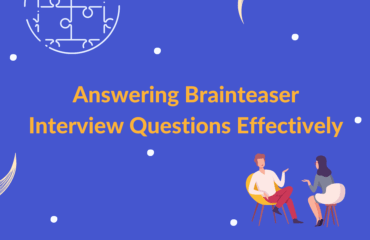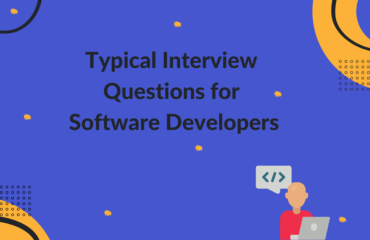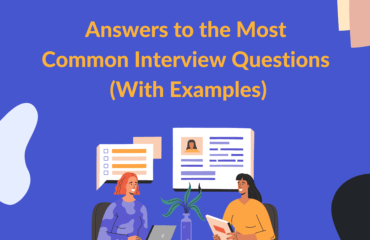Table of Contents
It is time to advance your career and claim a position in the C-suite team. Regardless of whether this is your first executive interview or not, getting ready is crucial to giving yourself the best possible chance of landing your dream job. In this blog post, we will explore the most typical interview questions for the C-suite, including some tips to make the most out of this interview. We will help you better understand the skills needed for an executive role and what companies are looking for. Are you ready to get the job?
What are companies looking for in an executive?
There is not only one answer to this question since each company has its own needs. However, there are some specific traits and skills that make a leader desirable. Most interview questions are designed to identify these traits and skills in a candidate. Therefore, your first goal is to have a clear overview of your strengths and weaknesses. Here are some of the most in-demand skills and traits that companies look for in a C-level candidate.
- Passion – Successful senior leaders are passionate about what they do, driven by the desire to achieve their goals, and motivate their employees to do the same.
- Action – A good executive has a strong sense of direction and an ability to drive change within their organization.
- Integrity – C-suite leaders are expected to act in the best interest of the organization and its people.
- Vision-seller – Good executives create a clear vision of the company’s future and communicate it effectively with employees and other stakeholders.
- Problem-solving – C-level executives must often address complex issues and make difficult decisions that impact the entire organization.
- Flexibility – Senior executives must be agile enough to respond to shifting priorities and quickly adapt to new situations.
- Comprehensive thinking – Top C-suite leaders can see the big picture and have a clear understanding of the factors that impact the success of the organization.
- Risk-taking – The ability to make decisions in the face of uncertainty and take calculated risks to achieve business goals is essential for a successful senior leader.
- Humility – Leading with humility is an effective way to establish trust and earn the respect of your employees.
- Influence – Effective senior leaders understand how to inspire others to take action and move the company forward.
Types of Executive Interview Questions
There are different types of interview questions that employers use to assess candidates for senior executive positions. Each interview type has its own purpose in evaluating various aspects of a candidate’s skills and experience. Let’s take a look at what they are and how to deal with them.
1) Personality interview questions
These questions focus on your character and are typically introductory. Employers use these questions to get a sense of who you are at a personal level and what kind of leader you will be. The best way to deal with this question is by discussing your values, your approach to leadership, and what motivates you to succeed.
2) Competency interview questions
Competency interview questions explore situations of your past. They are a great indicator of your experience, personality, and mentality of improvement. Some questions may involve specific examples from your leadership experience, while others may be more general in nature. The goal here is to stick to the question asked, skip any extra irrelevant info, and add a key takeaway.
3) Behavioral interview questions
Behavioral interview questions examine hypothetical scenarios that explore skills and are typically in the form of “what or how would you”. These questions focus on past behaviors and are intended to uncover how you would handle certain situations if you were hired for the leadership position. The key to answering such questions is to identify the associated skill and use it in your response.
4) Company-specific interview questions
These are questions specific to the organization itself. They may relate to the company’s mission, culture, philosophy, or values. Employers use these questions to gain insight into your values and determine if you would be a good fit for the organization. The best way to respond to these questions is to do your research on the company beforehand so you can articulate how your experiences align with its mission and goals.
Top executive interview questions and how to answer them
To be successful in an executive job interview, it is essential to be well prepared beforehand. Below, we compiled some of the most common questions that you can expect to face. We also provided some useful tips for answering them effectively.
Question 1: Describe some of the best qualities that you consider important to be a good leader.
Your response to this question will help the interviewer understand whether your professional values align with the company’s culture. Be specific by explaining how your leadership style has helped you lead a team to success in the past. You can also share a few personal traits that make you unique as a leader.
Answer Example: “I have been leading teams for the past ten years. During that time, I have developed a strong leadership style that focuses more on team building than individual performance. I have great respect for people and believe that my role is to guide and mentor my team rather than issuing orders. This approach has helped me build a team of talented individuals that have delivered excellent results for the business. I believe these are important attributes of a good leader.
Question 2: What do you find to be the most difficult part of your job as an executive?
As a leader, you will face many challenges in the job. This question is designed to help the interviewer understand your approach to handling and overcoming these challenges to drive success for the organization. An effective response will demonstrate that you are prepared to overcome any obstacles that may stand in the way of achieving your objectives.
Answer Example: “For me, the most challenging part of my job as an executive is dealing with uncertainty that surrounds business decisions. Each decision I make has an impact on the business and my team and I must ensure that I am providing effective solutions. I have learned to embrace and manage these challenges through careful analysis and thoughtful decision-making. This has allowed me to make informed choices that support business objectives while effectively managing team expectations.”
Question 3: What do you do to relax when not working?
Interviewers want to know if you are a well-rounded person with plenty of interests outside work. A great answer to this question shows that you understand how important it is to take time away from work to recharge your batteries. It also demonstrates that you are well-organized and prepared to balance the demands of your role with the rest of your life.
Answer Example: “When I’m not at work, I love spending time with my family. We always like to go hiking on weekends and spend the afternoon cooking a meal in our backyard barbeque. It’s a great way to unwind after a busy week at the office. I am also a big fan of sports and enjoy playing tennis in my spare time.”
Question 4: What is the most important lesson you have ever learned as a manager?
An interviewer asks this question to learn more about you as a person and what kind of leader you are. Provide a clear and concise answer that focuses on one important lesson that you learned in your career. Choose a lesson that is meaningful to you and clearly demonstrates how you’ve grown as a leader.
Answer Example: “As a manager, I’ve learned the importance of promoting a positive work environment and encouraging others to reach their potential. I’m a firm believer that people perform at their best when they feel respected and valued by their employers. I try to remember this when I make decisions about staff assignments and make sure each team member feels an important part of the team.”
Question 5: How do you define success?
Success can mean different things to different people. It’s important to identify your own definition of success and tailor your response to fit your own personal goals. Avoid generic answers that focus on fame, money, or power. Instead, explain how you would measure your own success if you were in a leadership role.
Answer Example: “I define success as doing what I’m passionate about, working with people I respect, and creating a positive impact. If I’m able to achieve these things in my career, I’ll consider my job to be a success.”
Question 6: What was the biggest change you’ve experienced/led?
Hiring managers ask this question to gain insight into how you manage change and lead teams through a difficult transition. Describe a situation that involved a challenging change and the steps you took to overcome it. Be sure to highlight the positive results of the change and how your actions affected the company’s bottom line.
Answer Example: “My previous company went through a lot of changes over the past few years. But my biggest accomplishment was leading the migration of our human resources database from an in-house system to the cloud. The change required a complete overhaul of our IT system and a new process to protect our data. As the Director, I had to set a clear vision for the project and communicate its importance to key stakeholders. I also worked closely with my team to make sure they understood the new system and how it would change their roles within the organization. In the end, it allowed my department to work more efficiently and saved us over half a million dollars in costs.”
Question 7: Describe a time when your boss or a board member criticized you. How did you feel and how did you handle it?
This question challenges your ability to take criticism and bounce back from it. A critical trait of a leader is the ability to take negative feedback and learn and grow from the experience. So, make sure to stay positive and focus on the message behind the feedback rather than the person delivering it.
Answer Example: “I received some harsh criticism from my boss during my first year as a Director of Marketing at my previous company. He was critical of some of my strategies and felt that they weren’t aligned with the company’s goals. I took it hard at first and didn’t know how to handle the situation. But after thinking about it for a while, I realized that his comments were valid and that I had to make changes in my approach. I decided to take a step back and assess what I was doing wrong. I worked with my boss to create and implement a new strategy that would better help meet our goals and he has since been very supportive of me.”
Question 8: What is the toughest decision you ever had to make?
Decision-making is a critical component of a leadership role. The interviewer wants to know how you think on your feet and make tough decisions under pressure. Provide an example that demonstrates your ability to make difficult choices and execute a plan when faced with adversity.
Answer Example: “Before making a tough decision, I make sure to weigh multiple options, consider different viewpoints, and think carefully about what’s best for the organization. The most difficult decision I had to make as a Director was to reduce staff benefits to help stabilize the company’s finances during the pandemic. It wasn’t easy to tell our employees that they were losing some of the perks they had grown accustomed to. However, it was necessary in order to keep the business afloat and preserve jobs.”
Question 9: Have you ever fired an employee? How did it make you feel?
Letting go of an employee can be a challenging situation for any leader. The interviewers use this question to understand how well you handle tough conversations and the aftermath. Your response should focus on why the termination was necessary for the company’s well-being rather than on blaming the employee for their performance or behavior. Make sure to remain professional and leave your personal feelings out of it as much as possible.
Answer Example: “Yes, I had to let go of an employee after he failed to meet performance expectations on several occasions. The employee was given several chances to improve and was offered additional training. However, he continued to struggle. It was a difficult decision to fire the employee but was necessary in order to restore integrity to the position and ensure that other employees followed the same standards.”
Question 10: Could you provide an example of a time you had to motivate your team?
Interviewers use this question to gain insight into your ability to lead a team and inspire them to achieve their goals. Talk through a situation where you had to challenge your employees to deliver their best work and how you went about motivating them to do so. Your response should demonstrate your ability to set clear expectations and hold employees accountable when they fall short.
Answer Example: “I recently had the opportunity to lead a cross-functional team working on a project that was critical to the success of the business. The team consisted of engineers, marketers, designers, and sales professionals, all of whom had very different areas of expertise. Throughout the project, our team faced many challenges, including limited resources and tight deadlines. I worked with the team to overcome the obstacles and achieve our goals. I assigned weekly individual and team goals, gave regular feedback, and provided support so that each member felt invested in the project’s success. In the end, we were able to deliver on schedule and exceed the expectations of the business.”
Question 11: How would you convince your team to adopt a certain idea?
Persuasion is a valuable skill that every leader should possess. This question is intended to test your ability to influence others to your point of view and encourage buy-in from your team. The key to answering the question is to be specific and outline the methods that you would use to convince your team to adopt a concept or solution.
Answer Example: “In order for me to persuade my team members to adopt a particular strategy, I would conduct thorough research to determine the business benefits associated with its implementation. Then, I would present the results to the team and lead a discussion to elicit feedback. This process would allow me to gain insight into the concerns of the team and other stakeholders so that I can address them and build consensus around the strategy.”
Question 12: What would you do to support a better workplace culture?
Effective senior C-suite executives understand the value of fostering a positive workplace culture that encourages team engagement and collaboration. This question is intended to examine your leadership style and your knowledge of the various methods for creating a more enjoyable and productive environment for your employees. Demonstrate that you have solid experience supporting positive workplace cultures by discussing some of the relevant initiatives you have implemented in the past.
Answer Example: “I am a strong believer that a successful business relies on a highly motivated and engaged workforce. In order to foster a positive work environment, I have established employee satisfaction surveys that are conducted on a regular basis to evaluate employee engagement levels and identify potential areas for improvement. I have also implemented a reward and recognition program to recognize employees for their hard work and celebrate company achievements. As a result, my previous company has seen a significant improvement in morale and employee retention over the past year.”
Question 13: How would you respond to employee complaints regarding organizational processes?
An effective C-suite executive understands the need to maintain a responsive and supportive approach to addressing employee concerns. This is your opportunity to highlight your excellent people management skills and demonstrate your ability to effectively resolve problems that arise in the workplace. Discuss your management style and explain the approach you would use to encourage open and honest dialogue among employees.
Answer Example: “I would meet with the employee to discuss their concerns and determine the root cause of the problem. From there, I would develop an action plan to address the issue and implement any necessary adjustments. I always maintain an open line of communication with my employees to ensure that we are working towards a common goal.”
Question 14: How would you approach a team member who’s performing poorly at work?
This question is designed to evaluate your communication style and your ability to handle a sensitive situation that may arise on the job. It helps the interviewer gain insight into your capacity to work with challenging employees and motivate them to improve. Explain how you would manage the situation and your rationale for taking the approach you outlined.
Answer Example: “In situations where an employee is struggling to meet expectations, I would meet with the individual to discuss the issues and identify areas where they need to improve. I would then introduce them to a performance improvement plan that would help drive a positive change. By providing my team with the resources and support they need to succeed, I have been able to cultivate a healthy work environment and develop high-performing employees in the long term.”
Question 15: In your first six months of employment, what would you like to accomplish?
Employers ask this question to determine how your plans align with the company’s goals and how you intend to contribute to its long-term success. Demonstrate your familiarity with the organization by articulating specific ways you can contribute to its growth during your time in the position. Ideally, you should frame your answer around an existing challenge or issue and explain your plan to address it.
Answer Example: “In my first six months on the job, I plan to complete a thorough analysis of the organization’s current processes to identify any areas where improvements could be made. I will use my findings to develop a roadmap that outlines our priorities moving forward. Once a clear roadmap has been established, I will implement the necessary changes to drive incremental growth and ensure the organization is well-positioned for continued success.
Here are other senior interview questions you might be asked. You may use our examples above as a reference for writing your own answers to the below questions.
- How would you describe your management style?
- What is your strategy for boosting business revenue?
- What techniques do you typically apply to assess an employee’s job performance?
- Describe a situation where you had to deal with uncooperative or challenging employees.
- Describe our company in your own words.
- In your opinion, what are the two things our business is doing well? What change do you believe we should make?
- What qualities do you seek in an ideal employee?
- Tell me about a time when you brought together people whose goals or viewpoints were initially in conflict.
- How would you respond to an unanticipated challenge or a circumstance brought on by a third party that has an impact on your bottom line?
- What kind of incentives would you give your staff for doing a good job?
- Which metrics do you believe are most crucial when evaluating performance?
- What do you think you could do better in your opinion?
- What would you do to improve departmental communication?
- What aspect of leadership gives you the most satisfaction?
General tips for giving the best responses
While there’s no hard and fast rule for answering executive interview questions well, there are ways to increase your chances of success. Below are some general tips to keep in mind to help you ace the interview and position yourself as the top candidate for the job.
- Highlight your achievements and the value you can bring to the company.
- Use the STAR (Situation, Task, Action, Result) technique to structure your answers and make them more impactful.
- Present a strong case for how you would lead the company towards a successful future and achieve positive results.
What to Avoid
Now that you know the best practices for answering executive interview questions, it’s also important to be aware of the things that can hurt your chances of landing your dream job. Let’s take a look at some of the most common pitfalls so you can avoid them in your next executive interview.
- Don’t ramble on for too long in your responses. Keep your answers short and to the point.
- Don’t show up unprepared. Hiring managers will expect you to be knowledgeable about the company, its objectives, and industry-level trends. So, make sure you do your research before walking into the interview.
- Don’t try to talk over the interviewer or dominate the conversation. This may send the wrong message and reflect arrogance.
Questions to ask your interviewer
Even though we explored questions that hiring managers will address, we could not skip the part about you questioning your interviewers. Now the roles reverse, and you have the time to find out if the company is the best fit for you. As a tip, we would encourage you to craft some personal questions based on your needs and expectations from the company. Here are some to get inspired:
- What is the company’s unique selling point?
- In what areas does the company excel?
- What is the employees’ retention rate?
- What is the organization’s biggest challenge in the coming year?
- How is the organization viewed by executives, clinicians, employees, and consumers?
- What would you change in the company?
- How do members of the C-suite work together and collaborate?
- How does the C-suite relate to the board?
- Do you see this as an organization where I could perform well and be happy?
- What is your vision for the company?
Getting ready for an interview becomes more challenging and time-consuming as the job level gets higher. Even though we deliver to-the-point and snackable content, speaking with an expert is the key to making the most out of your interview. In any case, we wish you good luck, and we would love to know about your interview and thoughts on our content. So, feel free to reach out.











